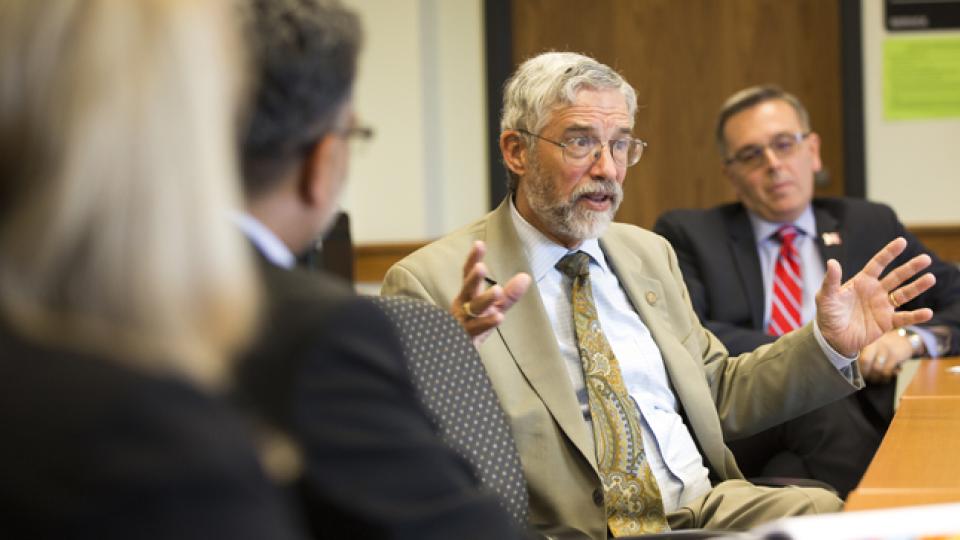
John P. Holdren, chief science adviser to President Obama, marked the one-year anniversary of a pioneering national report on climate change with a May 6 visit to the University of Nebraska-Lincoln.
During a series of discussions and meetings, Holdren, director of the White House Office of Science and Technology Policy, detailed the Obama administration’s efforts to address climate change while seeking input on climate-related science, impacts and responses from UNL administrators, faculty and students.
"It's a great pleasure to be out here with some of the folks we count on to be able to answer the president's questions (on climate change) and to craft programs and initiatives that make sense from the standpoint of people who really know what they’re doing," Holdren said.
"This is just a great place to talk about...working together to do what we can to improve the degree of preparedness and resilience in our society to cope with climate change."
Holdren's visit came one year after the Obama administration released the Third U.S. National Climate Assessment, the most comprehensive scientific report ever written on current and future climate changes in the United States. Stakeholders across the country are using information from the Third NCA to conduct their own climate impact assessments and inform resilience-focused decisions. The NCA can be found at http://nca2014.globalchange.gov.
"UNL is the ideal place to come to talk about these (issues) and to learn more from the folks here about what they're doing, because not only was the Third National Climate Assessment embraced by folks here...but (they also) have had a very central role over the years in building up the National Climate Assessment content," Holdren said.
Last September, UNL released "Understanding and Assessing Climate Change: Implications for Nebraska," an NCA-inspired report aimed at ensuring that businesses, communities, decision-makers and Nebraska's citizenry have the best available information about climate impacts in their region. The UNL report is available at http://go.unl.edu/9dq0.
Holdren participated in a roundtable featuring three of the UNL report's co-authors, who outlined its contents and laid out projections of climate change in Nebraska.
"One of the things that makes it so interesting to look at climate and weather in this part of the country is that we're kind of at the crossroads of a very strong temperature gradient and a very strong precipitation gradient," said Clint Rowe, a professor of earth and atmospheric sciences. "They cross basically over Nebraska, which makes the climate in Nebraska highly variable. It also means that this is where (many of) the shifts in climate change are going to happen."
Ronnie Green, Harlan Vice Chancellor of Agriculture and Natural Resources, moderated the roundtable.
"We're in a relatively unique position with the geography of Nebraska, because the collision of energy, water and food is probably more paramount here than most places in the world," Green said. "Climate change and resilience, on top of that, create a really important set of questions and challenges for us to be thinking about long-term."
Holdren later met with officials and researchers from the National Drought Mitigation Center and High Plains Regional Climate Center, both housed in UNL's School of Natural Resources. City of Lincoln leaders and regional stakeholders also took part in the day’s discussions.
— Scott Schrage, University Communications